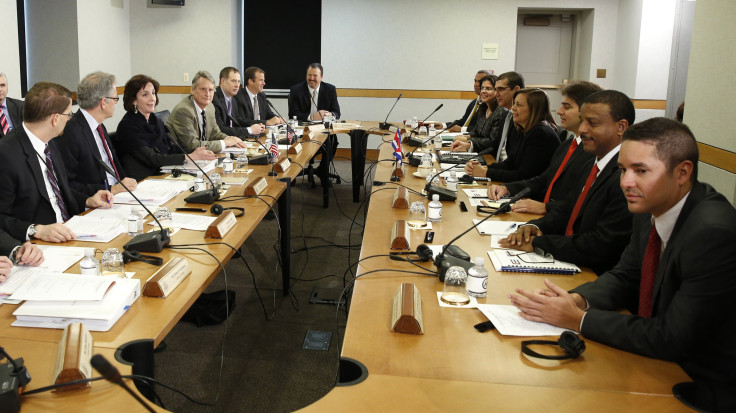
Cuban and U.S. delegates met in Washington on Friday for the second round of normalization talks set to thaw the two countries Cold War era tensions. The focus of today’s talks, according to the White House, is hammering out the final details of opening up embassies in both countries. In order to open those embassies, delegates are likely to discuss three issues: Cuba’s inclusion on the State Department’s terrorism list, banking, and access to U.S. embassies.
State Sponsor of Terror?
Cuba was originally added to the list in 1982 for its relationships with terrorist groups, mainly the Revolutionary Armed Forces of Colombia (FARC) and the Basque Fatherland and Liberty (ETA). The FARC are currently in peace talks that could very well see the end of a 50-year-old conflict, while ETA has held a peaceful ceasefire since 2011. According to multiple State Department reports there exists “no evidence of terrorist-related money laundering or terrorist financing activities in Cuba.”
Members of the list, which also include Iran, Sudan and Syria are automatically slapped with sanctions. Among the punitive measures are economic and trade restrictions, limits to diplomatic immunity, and a prohibition from U.S. banking institutions. it’s not technically impossible to move forward on embassies without removal from the list, but Cuban delegates see it as a flagrant “contradiction.”
Banking
One of the logistical problems presented by being on the list is that Cuban diplomats won’t be able to have bank accounts in the U.S. As the Washington Post’s Karen DeYoung explains, “Cuba’s diplomatic mission in Washington and its United Nations office in New York have been without access to banking services since last year, and Cuban officials say they cannot operate an embassy without a checking account.” State Department officials say that they have been trying to find a bank that would work with the Cubans, agreeing that the alternative -- running an embassy with bundles of cash -- is “not safe.”
Who Will Be Allowed At The Havana Embassy?
Another sticking point is who will be allowed at America’s future Embassy in Havana. State Department negotiators looked in the first round of talks for assurances that Cuba wouldn’t hinder it’s own citizens from entering the embassy. Cuba has long been wary of the U.S.’s support for dissidents and their “wet foot, dry foot” policy encouraging Cuban brain drain.
Another embassy issue is American diplomats are concerned about is their ability to move freely in Havana. According to a White House spokesman, that needs to be “in a different way than they do right now in Havana.” The spokesman did not specify if it was an issue of being followed or physically hindered from traveling.
© 2025 Latin Times. All rights reserved. Do not reproduce without permission.



